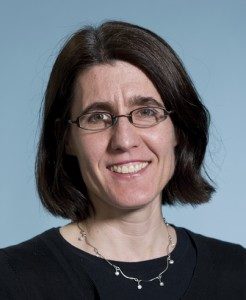
Deborah Martin, associate professor in the Graduate School of Geography at Clark University, Joseph Pierce (Florida State University) and James DeFilippis (Rutgers University), were recently awarded $175,000 by the National Science Foundation (NSF) for their four-year project titled “The scale of governance in the regulation of land: community land trusts in the Twin Cities.” Clark’s portion of the grant is $89,252. The project will employ graduate students at both Clark and Florida State University as research assistants, and, potentially, undergraduate assistants at a later time.
Community land trusts (CLTs) are private, not-for-profit organizations that own residential land in trust for a community defined by membership and geographical boundaries. Increasingly used to provide affordable housing, CLTs offer long-term renewable leases for the use of their land to members, who in turn own the homes built on that land. The CLT governing body is usually roughly divided between residents, community members (of the geographical area but not residents in the land trust itself) and other members.
Martin says she initially became interested in CLTs because they represent an unusual land ownership model, that of community-owned land with privately-owned housing.
“I am intrigued by the legal relations and mechanisms that underlie this structure,” she explains. “Furthermore, CLTs are explicitly about community identity. I think the potential downside of larger CLTs is that they might not be able to create the strong community identity that they desire. That might actually limit their effectiveness in providing an affordable-housing model based on community support and cohesion.”
Martin notes that questions arise when a CLT with origins in a neighborhood identity expands to a geographical area that includes an entire municipality. Who, then, is part of the community if the entire city is part of the area? How do residents develop a sense of community identity if they don’t live close to each other? Does this matter if the point is to get affordable housing to people?
Martin’s team will focus its research on CLTs in the Twin Cities of Minneapolis and St. Paul, Minnesota, which (as in the United States generally) operate at a wide range of geographical scales, from the sub-neighborhood to the urban region. Their spatial variety poses questions about the community identities that they produce, and the inter-institutional relationships their land-ownership model engenders. Through a combination of archival research and semi-structured and roving interviews, the team will explore the relationships between
- the geographic scale of a CLT in the Twin Cities area
- its engagement in regional land governance (including interactions with other non-profit and government agencies), and
- its geographical identity
The research will highlight how the meanings of community and property can be negotiated through public and private institutions at multiple scales. By attending to alternative governance structures of differently-scaled CLTs in a single region, the project will offer insights about urban development, community identity, and land regulation. Consequently, it will inform understandings of urban governance and land use policy, particularly housing land trust policies.
“This research draws upon my previous NSF-funded scholarship examining the socio-legal processes shaping land use and place meaning,” explains Martin. “It provides an opportunity to combine my interests in place identity with a better understanding of the legal and inter-governmental relationships shaping urban policies, in this case, affordable housing policies.”
Deborah Martin is an urban geographer with interests in place identity, local politics, legal geography, qualitative methodologies, and social movements (particularly neighborhood activism). She has conducted research in St. Paul and Athens, Georgia on place, meaning and representation in community organizing and local politics. That work has been extended to Worcester in two areas: geography and law, and human-environment research on place identity, resilience, and urban resource policy-making.


